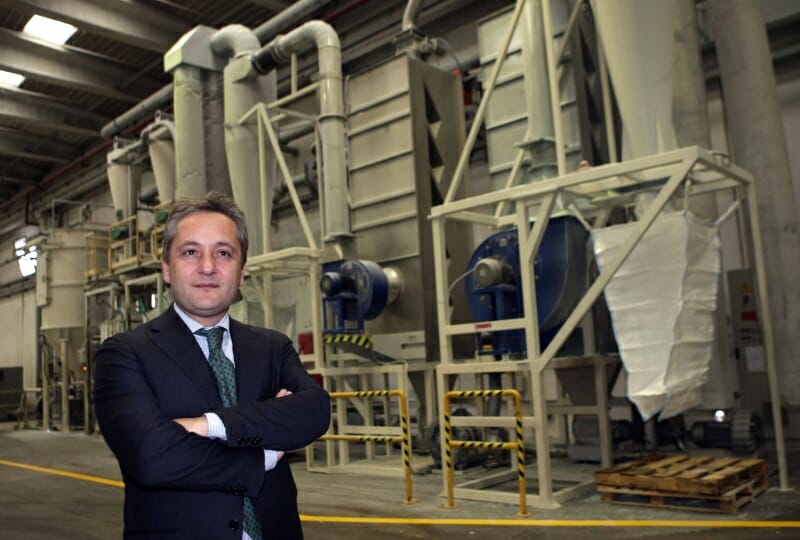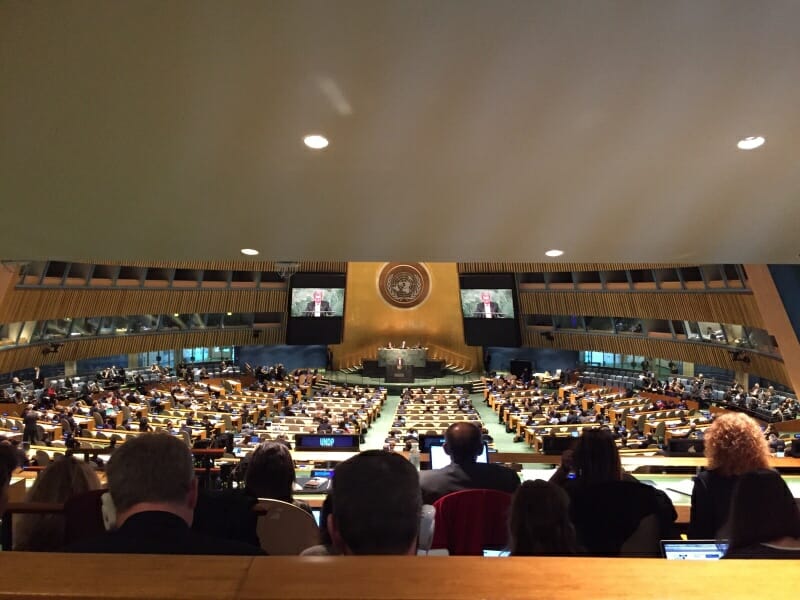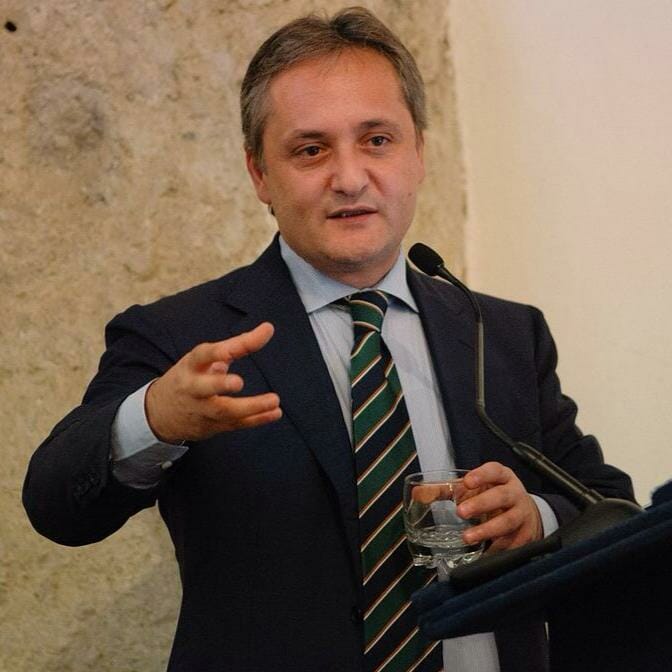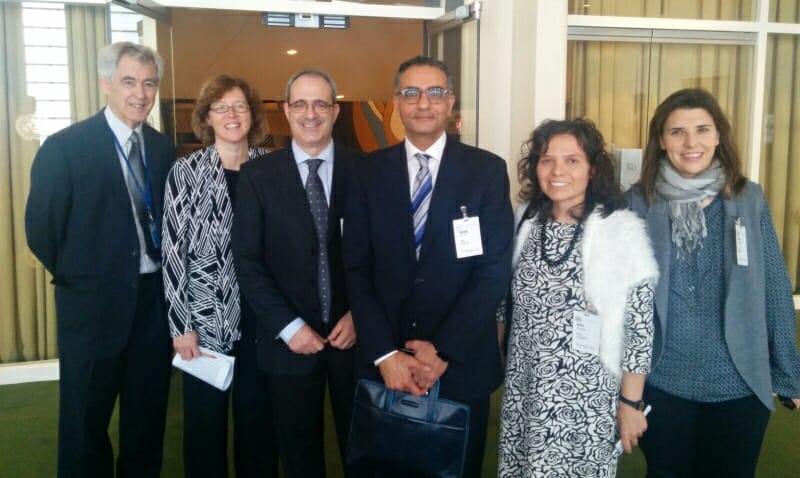

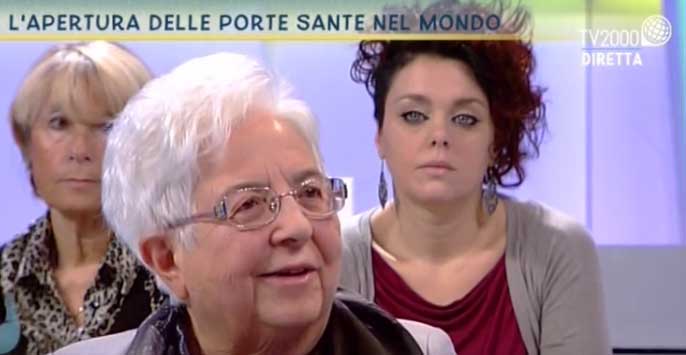
The Opening Of the Holy Doors: an interview with Maria Voce
 “Bel tempo si spera”, [Hoping for good times] is a programme broadcast by the Catholic Television Company TV2000. The programme on 14th December focused on subjects concerning the Jubilee, taking the viewers on a journey to several Cathedrals in the world, on the day after the opening of their Holy Doors. Maria Voce was in the studio, at the invitation of the presenter Lucia Ascione. Between one stage and another of this symbolic tour a dialogue took place on various subjects, starting with the meaning of the Jubilee. Maria Voce said, “The Year of Mercy gives us new courage to believe that God is Love. Now, when it seems that everything has become relative, we need to go back to what really matters, to believe in Love”. Later on, she added: “Unfortunately, modern culture speaks of anger, revenge, rights that have been trampled on, things that lead to sadness and despondency. We want to bring trust, forgiveness and mutual love. We want to look at the world as one family, the family of God’s children. And God is mercy, God is love.” “I like to recall – she went on – that the Pope did not open “the” Holy Door” but many holy doors. Pope Francis has said even the door of a prison cell can be a Holy Door. The door is a sign of the merciful love of the Father who is waiting for us all to come home, no-one excluded.” Lucia Ascione referred to Pope Francis’ words at the Angelus the previous day concerning the Focolare’s dialogue with Muslims. Maria Voce affirmed, “This harmonious encounter between people of different faiths that we experience did not happen yesterday, but has been built up day by day, over the years and in many places, through friendships; respecting difference.” Ascione insisted: “If it is so simple for you, why is it so hard for the world?” Maria Voce: “The Pope has said that unfortunately there is much self-interest. Instead we need to learn how to go beyond ourselves and be ready to welcome others, even if they are different. It is a love that we learn by loving, going towards others. Certainly, differences can make us fearful, that is true for everyone. It is a fear that can only be overcome with love. Taking up arms is of no use.” The presenter asked “You went to the United Nations and spoke there. What did you say to them? “I said that we need to convert ourselves, but not superficially. I said we must not see dialogue as one of many ways but as the only real way forward. It is difficult to accept this viewpoint because the “scandal of the cross” has not been understood. Mercy makes us do the part that the other should do, as Jesus did who died for each one of us.” Maria Voce explained “It is the experience that we have on a daily basis with those who knock on our doors. Recently 170 unaccompanied minors stayed in our little town in Holland and were made welcome”. Recalling the words of the press release that Maria Voce had issued after the Paris attacks, Ms Ascione asked: “What did you mean when you said we should ask ourselves whether everything that could have been done to avoid such violent reactions had been done?” “Very often we are affected by things that happen nearby, forgetting those that happen in other places where the horror of war is lived every day. We have communities in those places and we know that it is still possible to build something positive. We have doctors who don’t check to see whether a wounded person is a Christian or a Muslim; people who make their wells available to others when water is scarce, regardless of the religion they practice. Maybe we don’t know how to ask ourselves the right questions. That is why we questioned ourselves first of all. Perhaps we did not follow through with these things in the past. Being able to make an examination of conscience can open us up to hope. Seeing those who suffer, who are poor, we must not be afraid to open our hearts. We must not be afraid to empty our pockets and our wallets, to live simply and with respect for creation, seeing other people as brothers and sisters, part of the same family.”
“Bel tempo si spera”, [Hoping for good times] is a programme broadcast by the Catholic Television Company TV2000. The programme on 14th December focused on subjects concerning the Jubilee, taking the viewers on a journey to several Cathedrals in the world, on the day after the opening of their Holy Doors. Maria Voce was in the studio, at the invitation of the presenter Lucia Ascione. Between one stage and another of this symbolic tour a dialogue took place on various subjects, starting with the meaning of the Jubilee. Maria Voce said, “The Year of Mercy gives us new courage to believe that God is Love. Now, when it seems that everything has become relative, we need to go back to what really matters, to believe in Love”. Later on, she added: “Unfortunately, modern culture speaks of anger, revenge, rights that have been trampled on, things that lead to sadness and despondency. We want to bring trust, forgiveness and mutual love. We want to look at the world as one family, the family of God’s children. And God is mercy, God is love.” “I like to recall – she went on – that the Pope did not open “the” Holy Door” but many holy doors. Pope Francis has said even the door of a prison cell can be a Holy Door. The door is a sign of the merciful love of the Father who is waiting for us all to come home, no-one excluded.” Lucia Ascione referred to Pope Francis’ words at the Angelus the previous day concerning the Focolare’s dialogue with Muslims. Maria Voce affirmed, “This harmonious encounter between people of different faiths that we experience did not happen yesterday, but has been built up day by day, over the years and in many places, through friendships; respecting difference.” Ascione insisted: “If it is so simple for you, why is it so hard for the world?” Maria Voce: “The Pope has said that unfortunately there is much self-interest. Instead we need to learn how to go beyond ourselves and be ready to welcome others, even if they are different. It is a love that we learn by loving, going towards others. Certainly, differences can make us fearful, that is true for everyone. It is a fear that can only be overcome with love. Taking up arms is of no use.” The presenter asked “You went to the United Nations and spoke there. What did you say to them? “I said that we need to convert ourselves, but not superficially. I said we must not see dialogue as one of many ways but as the only real way forward. It is difficult to accept this viewpoint because the “scandal of the cross” has not been understood. Mercy makes us do the part that the other should do, as Jesus did who died for each one of us.” Maria Voce explained “It is the experience that we have on a daily basis with those who knock on our doors. Recently 170 unaccompanied minors stayed in our little town in Holland and were made welcome”. Recalling the words of the press release that Maria Voce had issued after the Paris attacks, Ms Ascione asked: “What did you mean when you said we should ask ourselves whether everything that could have been done to avoid such violent reactions had been done?” “Very often we are affected by things that happen nearby, forgetting those that happen in other places where the horror of war is lived every day. We have communities in those places and we know that it is still possible to build something positive. We have doctors who don’t check to see whether a wounded person is a Christian or a Muslim; people who make their wells available to others when water is scarce, regardless of the religion they practice. Maybe we don’t know how to ask ourselves the right questions. That is why we questioned ourselves first of all. Perhaps we did not follow through with these things in the past. Being able to make an examination of conscience can open us up to hope. Seeing those who suffer, who are poor, we must not be afraid to open our hearts. We must not be afraid to empty our pockets and our wallets, to live simply and with respect for creation, seeing other people as brothers and sisters, part of the same family.”
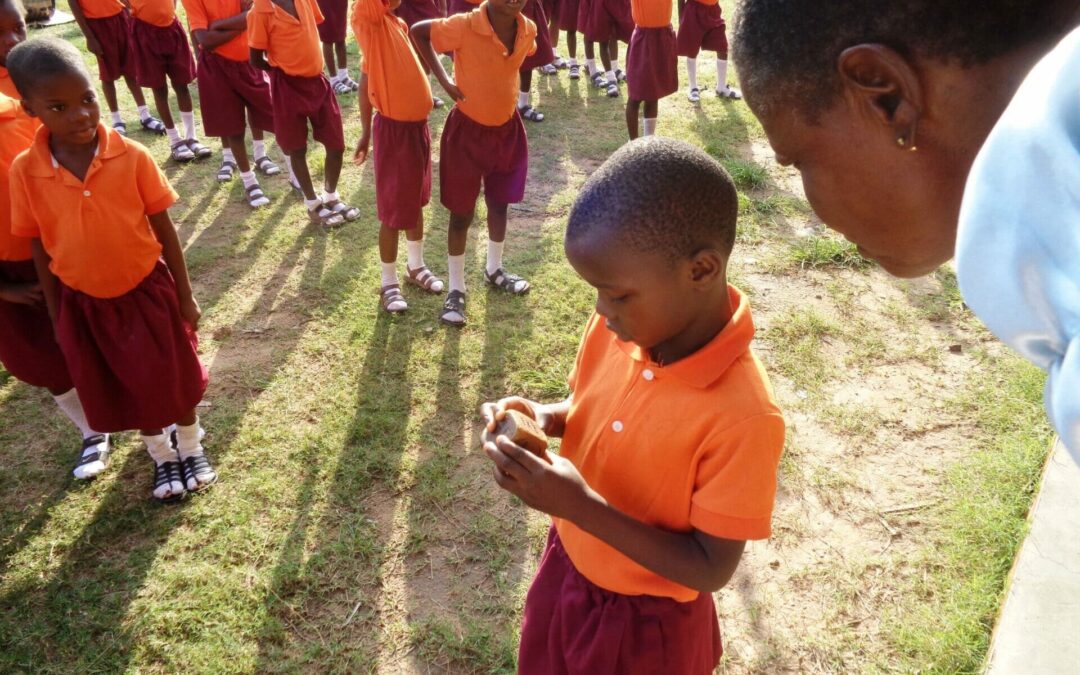
Nigeria: educating towards a culture of peace
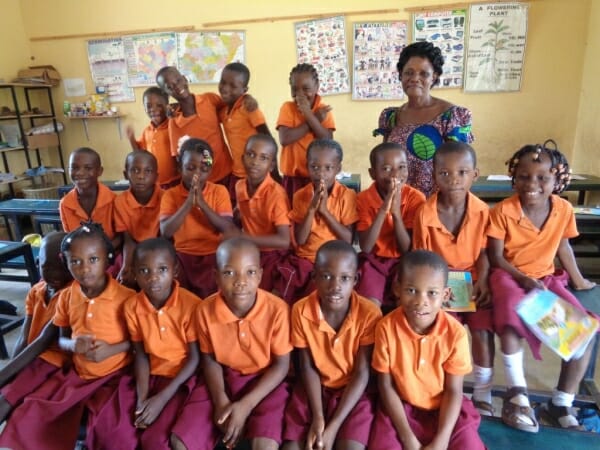 Education is one of the most important challenges the Nigerian schooling system has to face, and where at times Nigerian society has to deal with aggressive behavior and religious traditions that imbue fear and a sense of helplessness in the face of evil. “One day,” Christiane recounts, ” a mother stopped bringing her daughter to school because we had asked the parents to cut the hair of the children who were about to start the first year of nursery school. She said that someone who was believed to be in contact with spirits had told her that her daughter would die if she cut her hair. And this explained why the child no longer went to school.” Christiane who is of German origin, had worked for many years in the youth section of the Focolare. Through support from a distance project of the New Families association, today she still works with children in Igbariam, a village 40 km away from Onithsa city, south-east of Nigeria, and where the “Fraternity School” is established. The project started in 1995 as a result of the efforts of a group of the Focolare, which started in the 1980s a human promotion process to offer concrete development opportunities through deep relationships with the local people and respect for local traditions. “Through concrete acts of love for some children, an after-school club was formed, which later, slowly turned into a nursery and then an elementary school. Starting from the nursery school, the endeavour is to give the children a global education, preparing them to face the many challenges of this great nation.” Instituted in 2006, today the school counts 223 students, with 75 in the nursery and 148 in the primary school. With time, also the parents became involved in an educational and social project which avails of an educational method based on human values, a teaching style that believes in and respects the dignity of the child as a person. Attention is paid particularly to the smaller ones, just as the Gospel says, offering new tools for global human growth. For example, the “dice of love” is used, with which students and teachers live their daily commitment to peace and solidarity.
Education is one of the most important challenges the Nigerian schooling system has to face, and where at times Nigerian society has to deal with aggressive behavior and religious traditions that imbue fear and a sense of helplessness in the face of evil. “One day,” Christiane recounts, ” a mother stopped bringing her daughter to school because we had asked the parents to cut the hair of the children who were about to start the first year of nursery school. She said that someone who was believed to be in contact with spirits had told her that her daughter would die if she cut her hair. And this explained why the child no longer went to school.” Christiane who is of German origin, had worked for many years in the youth section of the Focolare. Through support from a distance project of the New Families association, today she still works with children in Igbariam, a village 40 km away from Onithsa city, south-east of Nigeria, and where the “Fraternity School” is established. The project started in 1995 as a result of the efforts of a group of the Focolare, which started in the 1980s a human promotion process to offer concrete development opportunities through deep relationships with the local people and respect for local traditions. “Through concrete acts of love for some children, an after-school club was formed, which later, slowly turned into a nursery and then an elementary school. Starting from the nursery school, the endeavour is to give the children a global education, preparing them to face the many challenges of this great nation.” Instituted in 2006, today the school counts 223 students, with 75 in the nursery and 148 in the primary school. With time, also the parents became involved in an educational and social project which avails of an educational method based on human values, a teaching style that believes in and respects the dignity of the child as a person. Attention is paid particularly to the smaller ones, just as the Gospel says, offering new tools for global human growth. For example, the “dice of love” is used, with which students and teachers live their daily commitment to peace and solidarity. 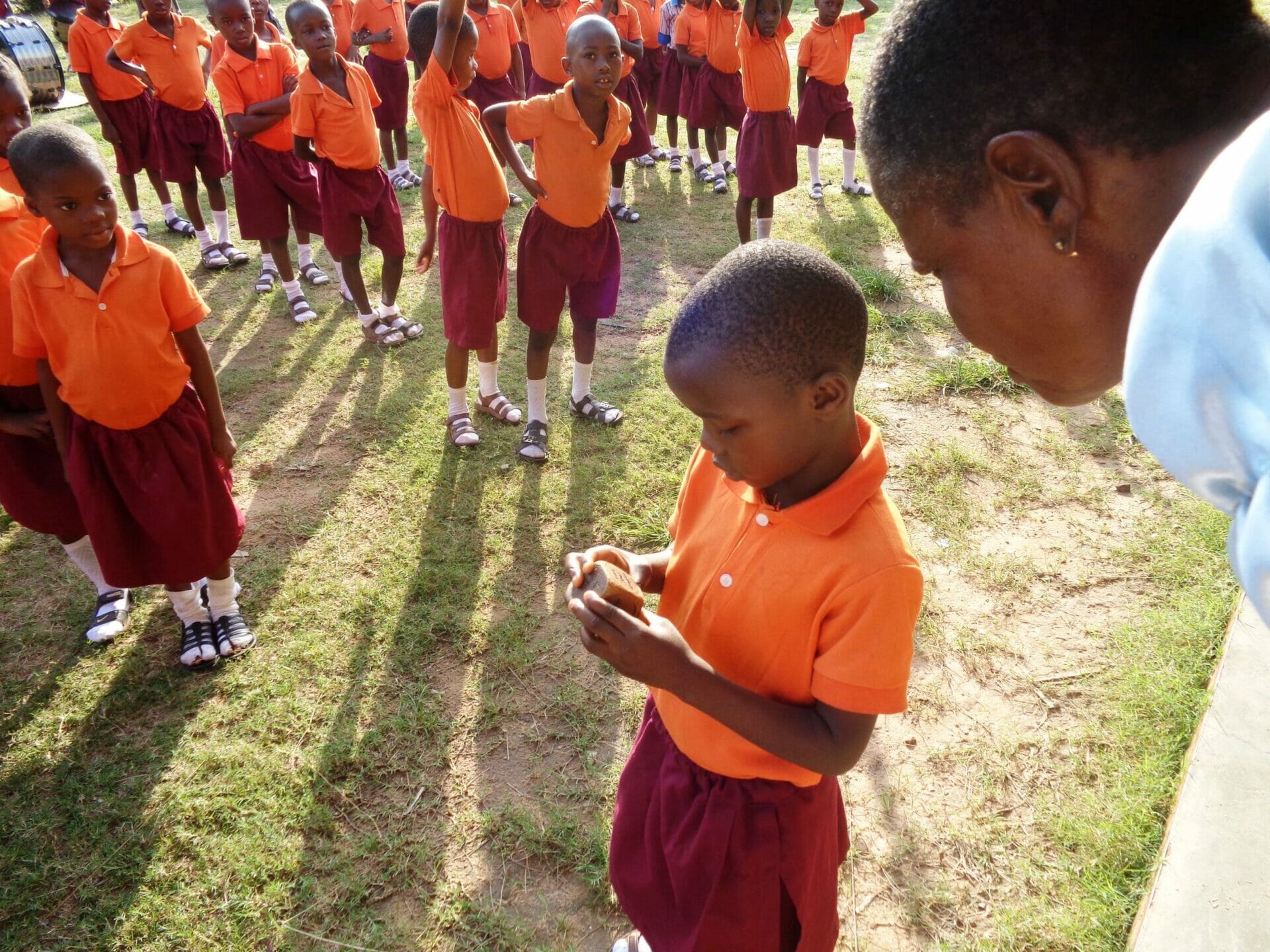 It is also a novelty since in many Nigerian schools, physical punishment is considered a necessary practice in the educational process. The idea in force is “Spare the rod and spoil the child,” and it is not easy to change this mentality. However, in an interview with the newly instituted “New City Nigeria,” Mrs. Akwobi of the Nwafor Orizu College of Education Nsugbe, affirmed that “current psychological studies have demonstrated that the negative effects of these corrective measures surpass the positive ones and that the children often become tense and aggressive with physical punishments. They are unable to empathise with the teachers and transfer this rejection to the subjects they teach.” Mrs Akwobi went on to say: “Instead, it is important that they are able to develop awareness in choosing the good and not only to avoid punishment. The teacher should behave as one who always has something to learn, because teaching is a two-way process. Listening to others, patience, and comprehension have a positive effect on the children and their learning abilities. Furthermore, adopting nonviolent measures in school relationships helps to also reduce the rate of violence in society. These educational principles are being implemented in the Fraternity School in Nigeria.” Christiane concluded by saying: “Here, many people leave to look for a better life in Europe. Our job aims at helping people to build a liveable experience in their own countries. Thank you for whatever help you can give! You cannot imagine how much it is helping us to proceed with social works, spread a new culture, and contribute to the development of this country based on Christian love.” Solidarity at a distance: http://www.afnonlus.org/
It is also a novelty since in many Nigerian schools, physical punishment is considered a necessary practice in the educational process. The idea in force is “Spare the rod and spoil the child,” and it is not easy to change this mentality. However, in an interview with the newly instituted “New City Nigeria,” Mrs. Akwobi of the Nwafor Orizu College of Education Nsugbe, affirmed that “current psychological studies have demonstrated that the negative effects of these corrective measures surpass the positive ones and that the children often become tense and aggressive with physical punishments. They are unable to empathise with the teachers and transfer this rejection to the subjects they teach.” Mrs Akwobi went on to say: “Instead, it is important that they are able to develop awareness in choosing the good and not only to avoid punishment. The teacher should behave as one who always has something to learn, because teaching is a two-way process. Listening to others, patience, and comprehension have a positive effect on the children and their learning abilities. Furthermore, adopting nonviolent measures in school relationships helps to also reduce the rate of violence in society. These educational principles are being implemented in the Fraternity School in Nigeria.” Christiane concluded by saying: “Here, many people leave to look for a better life in Europe. Our job aims at helping people to build a liveable experience in their own countries. Thank you for whatever help you can give! You cannot imagine how much it is helping us to proceed with social works, spread a new culture, and contribute to the development of this country based on Christian love.” Solidarity at a distance: http://www.afnonlus.org/
The Netherlands: Giving a home
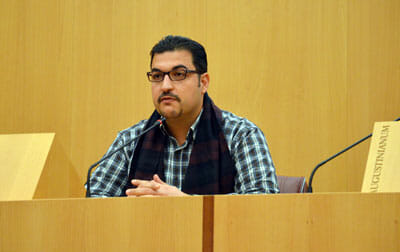
Muslims and Christians Step Onto the Field for Fraternity
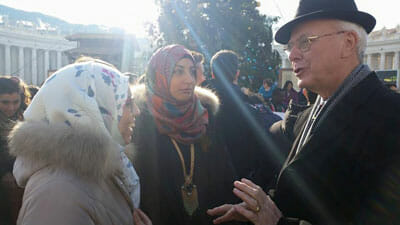 “Carry on! Carry on with courage along the road of dialogue and brotherhood, because we are all children of God!” Pope Francis forcefully told the hundred people from the Focolare and several Italian Muslim communities at the end of the December 13th Angelus. They had come together to testify to their common journey that has been underway for many years, “Christians and Muslims Together in Building Peace,” as the banner they held read on Saint Peter’s Square. There were imams with their communities from Rome, Trieste, Teramo, and Catania, young women and teenagers from the Mosque of Centocelle in Rome, families and children, scholars and journalists. There was also a delegation from the Buddhist, Risho Kosei Kai Movement, and representatives from Religions for Peace and from other religions. From the festive atmosphere on Saint Peter’s Square, the group of 400 people moved to the seat of the Augustinianum which is just a few hundred metres from the colonnade surrounding Saint Peter’s Square. The lunch they shared provided a setting for some jovial interaction that everyone was looking forward to; there was a prayer room for Muslims; Mass for Catholics – such an unusual event that it was widely covered in the press.
“Carry on! Carry on with courage along the road of dialogue and brotherhood, because we are all children of God!” Pope Francis forcefully told the hundred people from the Focolare and several Italian Muslim communities at the end of the December 13th Angelus. They had come together to testify to their common journey that has been underway for many years, “Christians and Muslims Together in Building Peace,” as the banner they held read on Saint Peter’s Square. There were imams with their communities from Rome, Trieste, Teramo, and Catania, young women and teenagers from the Mosque of Centocelle in Rome, families and children, scholars and journalists. There was also a delegation from the Buddhist, Risho Kosei Kai Movement, and representatives from Religions for Peace and from other religions. From the festive atmosphere on Saint Peter’s Square, the group of 400 people moved to the seat of the Augustinianum which is just a few hundred metres from the colonnade surrounding Saint Peter’s Square. The lunch they shared provided a setting for some jovial interaction that everyone was looking forward to; there was a prayer room for Muslims; Mass for Catholics – such an unusual event that it was widely covered in the press.
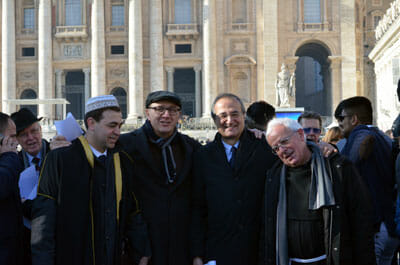
From left: Imam Maher Akkad, Antonio Olivero, Michele Zanzucchi, father Egidio Canil

Amjad Zedan, a Syrian student from Sophia University Institute
Pope Francis to gathering of Christians and Muslims: “Go ahead with courage and through dialogue”
https://vimeo.com/148880588 ITALIAN with ENGLISH subtitles
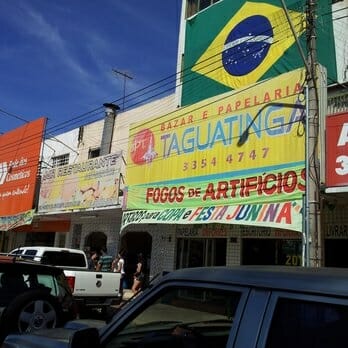
Economy of Communion: on the side of the beneficiaries
 It is impressive to discover that not only is there no exploitation and unfair competition, but also no play on interest rates. These entrepreneurs, like those who have signed up for an Economy of Communion (EoC) – about a thousand throughout the world – pursue the objective of profits that ensure vitality and continuity to their businesses, and wish to live the ”culture of giving” according to the finalities of the project itself: to help the formation and education of the young generations towards this new mentality. Thus they freely and concretely place a part of their turnover at the service of the project. Socoro and Gomes, Brazilians live in Taguantinga City, in the Federal District. They already had six children when he lost his job because he was an alcoholic. To maintain the family, she worked as a household helper, but earned very little. Left by themselves, the children became so disoriented to the point that the eldest, an adolescent, got involved in drugs. The Focolare came to their aid and offered the boy a job in the Fazenda da Esperança, a rehab community inspired by the spirituality of the Focolare. The family also had to shoulder serious housing problems, since their house was not only a makeshift one but also too small for such a big family. They also risked losing the house since they had stopped paying the person who had given them a loan. They presented this problem to the EoC Commission of their region. After a careful analysis, they were offered a loan to cover the late payments, to be paid back according to their capacity to do so. Meanwhile, Gomes started a small business with gas bottles, but because of his alcoholism was unable to keep up with it. Those were really difficult times for them. In addition to their serious economic difficulties, there were squabbles and lack of dialogue. Amid all this, Gomes suffered a heart attack. Unexpectedly, Socoro was offered a permanent job, as a household helper to a Cardinal, who employed her with a regular contract and a just salary. One day when he went to visit the family, he had an important chat with Gomes, who decided to give up his addiction and change his lifestyle. Later on the EoC Commission also visited them to verify their housing situation, and on that occasion offered to insert them in the Habitaçao project within the EoC framework, which provides for the restructuring or renovation of houses for extremely poor families. «When I was told about this– confided Socoro – I was really moved. I had the sensation that God himself was giving us this possibility.» The renovation work was mostly done by members of the Focolare community, some of them worked from 5.30 am to 7 pm. Now the house has a living room, bathroom, master’s bedroom and one for the boys and another for the girls. Living in a house with these requisites helps its inhabitants to regain their personal dignity. Gomes is completely rehabilitated, and has become another person altogether. The couple’s older daughters are now in university, thanks to a scholarship. «Seeing our daughters so committed to their studies– says Gomes – made me also feel the urge to enroll in a course for adults to obtain a diploma.» Even though he had not studied for 38 years, it was a challenge he wanted to meet. In the class, he learned to overcome his shame for being the oldest among the students. His kindness helped him to achieve his goal. When the results of the exams for the Bank of Brasilia and the Ministry of Tourism were given, he managed to classify among the top 200 and was employed in the bank as a clerk.
It is impressive to discover that not only is there no exploitation and unfair competition, but also no play on interest rates. These entrepreneurs, like those who have signed up for an Economy of Communion (EoC) – about a thousand throughout the world – pursue the objective of profits that ensure vitality and continuity to their businesses, and wish to live the ”culture of giving” according to the finalities of the project itself: to help the formation and education of the young generations towards this new mentality. Thus they freely and concretely place a part of their turnover at the service of the project. Socoro and Gomes, Brazilians live in Taguantinga City, in the Federal District. They already had six children when he lost his job because he was an alcoholic. To maintain the family, she worked as a household helper, but earned very little. Left by themselves, the children became so disoriented to the point that the eldest, an adolescent, got involved in drugs. The Focolare came to their aid and offered the boy a job in the Fazenda da Esperança, a rehab community inspired by the spirituality of the Focolare. The family also had to shoulder serious housing problems, since their house was not only a makeshift one but also too small for such a big family. They also risked losing the house since they had stopped paying the person who had given them a loan. They presented this problem to the EoC Commission of their region. After a careful analysis, they were offered a loan to cover the late payments, to be paid back according to their capacity to do so. Meanwhile, Gomes started a small business with gas bottles, but because of his alcoholism was unable to keep up with it. Those were really difficult times for them. In addition to their serious economic difficulties, there were squabbles and lack of dialogue. Amid all this, Gomes suffered a heart attack. Unexpectedly, Socoro was offered a permanent job, as a household helper to a Cardinal, who employed her with a regular contract and a just salary. One day when he went to visit the family, he had an important chat with Gomes, who decided to give up his addiction and change his lifestyle. Later on the EoC Commission also visited them to verify their housing situation, and on that occasion offered to insert them in the Habitaçao project within the EoC framework, which provides for the restructuring or renovation of houses for extremely poor families. «When I was told about this– confided Socoro – I was really moved. I had the sensation that God himself was giving us this possibility.» The renovation work was mostly done by members of the Focolare community, some of them worked from 5.30 am to 7 pm. Now the house has a living room, bathroom, master’s bedroom and one for the boys and another for the girls. Living in a house with these requisites helps its inhabitants to regain their personal dignity. Gomes is completely rehabilitated, and has become another person altogether. The couple’s older daughters are now in university, thanks to a scholarship. «Seeing our daughters so committed to their studies– says Gomes – made me also feel the urge to enroll in a course for adults to obtain a diploma.» Even though he had not studied for 38 years, it was a challenge he wanted to meet. In the class, he learned to overcome his shame for being the oldest among the students. His kindness helped him to achieve his goal. When the results of the exams for the Bank of Brasilia and the Ministry of Tourism were given, he managed to classify among the top 200 and was employed in the bank as a clerk.
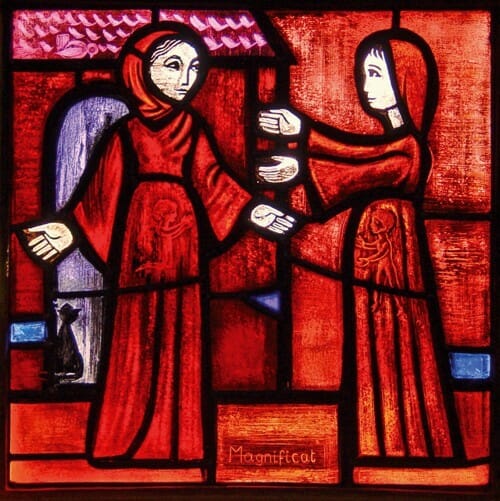
Igino Giordani: Mercy in the Magnificat
At the centre of the Magnificat, which gathers momentum from the prophets with the promise of salvation, there is a mention of Divine Mercy that could seem like a rhetorical addition. It seems to me that the reference to the mercy of the Father, at the centre of Mary’s song, is of capital importance and contains the concise explanation for all the exuberant divine facts that give unheard of beauty and steady immediacy to the poetic outburst of the fifteen year old girl who carried and grew Jesus in her womb. In the first part, Mary exalts “the Almighty who has done great things” to His “servant” so that all generations shall call her blessed. God had done the miracle of the Incarnation of the Word, through a poor and humble girl from an obscure village of Israel; an act that will lead to the salvation of humanity of all times. Thus she observes: “His name is holy – and his mercy extends from generation to generation …”. Redemption originates in an act of compassion by the Heavenly Father towards his children. If He accomplished that prodigy of love, which only a God could accomplish, of his Son being born of a woman of the people and have him die for the sake of the people, it is all due to an act of mercy, a miracle of mercy that is love raised to its peak. This demands that we pardon our brother not only seven times, but up to seventy times seven time; that is, always, all the way to infinity; that we love him to the point of giving up our life for him. God “has helped his servant, Israel – ever mindful of his mercy. . .” Everything in the divine government everything leads back to mercy. This will be clarified and confirmed in the demeanour of Jesus – out of love for whom Mary speaks – when He will feed the crowds and cure the sick; when he will drive the sellers from the Temple and raise his voice against the Pharisees and the proud. The Magnificat is the anthem of the Christian revolution. But its most revolutionary aspect lies in its origin: mercy. This is why it does not destroy, but creates; because love for God and man does not produce anything else but good. The Magnificat gives the directives of the evolutionary process, mutation and rebirth, in which the Gospel ideal is translated socially and politically, as well as spiritually; a mutation that originates in love and is embodied in mercy. There is a new urgent need for such an ideal today. Ideologies and protests, guerrilla warfare and revolt are breaking out everywhere. They call for greater and beautiful aspirations while they introduce hateful programs of destruction. Mary teaches how to orient and construct this revolution. She is a woman, the Mother of God, who teaches both with word and life: the life of the Mother of Mercy. Her example is worth even more today, as it revalues femininity. Mary teaches us the path of mercy. By now the absurdity and uselessness of wars is acknowledge, that is, hatred, and the need for rational systems focused on dialogue, negotiation and, above all, of intervention and gifts from those who have, in favour of those who have not. We can see it: sending arms and money to help this or that population serves only to increase the conflicts in which people suffer, agonise and die; and to plant seeds of hatred against the very givers. The perspective of that young woman, who sang her Magnificat, the method of mercy, amongst the poor, is the perspective of the divine and human intelligence, the only one capable of resolving the problem of a world threatened by the ultimate definitive catastrophe, provoked by the stupidity of hatred and the drug of suicide. To have peace and wellbeing again, we need to take care of the material and moral wounds of those who suffer, from whatever side of the ocean, in Europe and in Asia, in America and in Africa, using a compassion that is the fruit of understanding; a charity that was not grow weak, but abolishes injustices and selfishness, to transform coexistence into community, and nations into a family. Jesus, the Son of Mary wants it to be so, as Mary his Mother assures. Igino Giordani, in Mater Ecclesiae, 4, 1970. www.iginogiordani.infoEnvironmental protection is also a matter of justice
